June 17, 2025 | 12:17 GMT +7
June 17, 2025 | 12:17 GMT +7
Hotline: 0913.378.918
June 17, 2025 | 12:17 GMT +7
Hotline: 0913.378.918
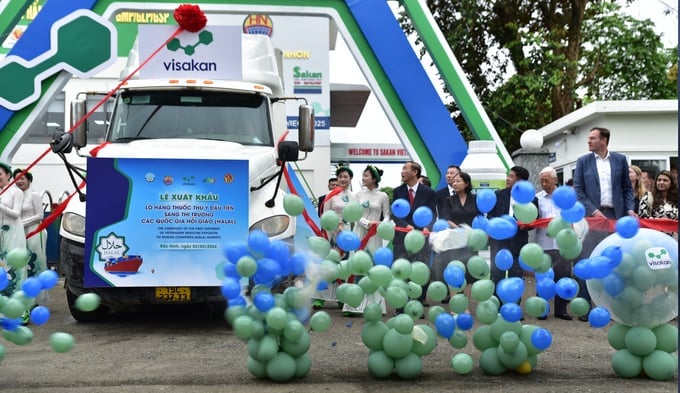
Deputy Minister Phung Duc Tien and delegates cutting the ribbon at the ceremony for the first export shipment of veterinary medicine to the Halal market. Photo: Minh Phuc.
Participants of the ceremony for the first export shipment of veterinary medicine to the Halal market include Mr. Phung Duc Tien, Deputy Minister of the Ministry of Agriculture and Rural Development; Ms. Nguyen Huong Giang, Chairwoman of the Bac Ninh Provincial People's Committee; representatives from the Embassies of Nigeria, Myanmar, Denmark, Bangladesh, Indonesia, Pakistan, Myanmar; Mr. Gabor Fluit, Global CEO of Royal De Heus.
During the ceremony, Mr. Vu Manh Hung, Chairman of Hung Nhon Group and Chairman of Visakan Company, shared: "This is the first time Visakan has exported veterinary medicine to the Halal market."
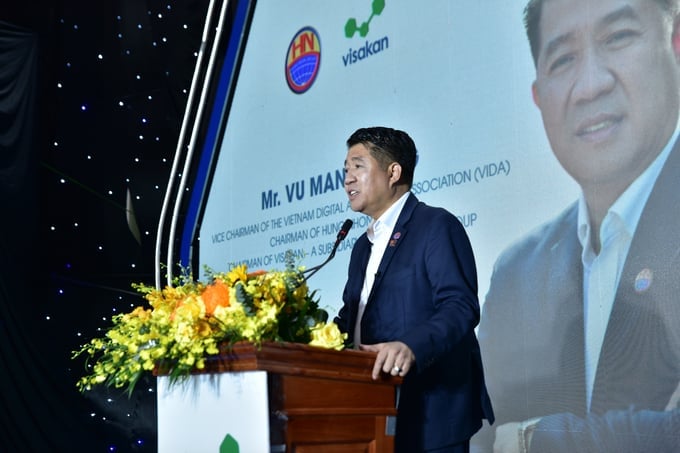
Mr. Vu Manh Hung, Chairman of Hung Nhon Group and Visakan Company, commits to collaborating with the agriculture sector to open up export markets for agricultural products and veterinary drugs to potential markets, including Islamic countries. Photo: Minh Phuc.
According to the Global Islamic Economy Report, spending on Halal food is projected to increase rapidly from 1.4 trillion USD in 2020 to 1.9 trillion USD in 2030, and nearly USD 5 trillion in 2050. As a result, the Halal market holds significant potential for Vietnamese businesses, who possess the advantage of raw materials and a strategic location within Asia, home to approximately 62% of the world's Muslim population.
However, according to Mr. Vu Manh Hung, Islamic countries are one of the most demanding markets in the world. Notably, businesses must meet Halal standards in order to gain access to this market.
Halal is a strict standard in Islam, which encompasses every aspect from the smallest component of a product to the important stages of processing and transportation. Due to the stringent Halal requirements for products originating from animals, Vietnam's Halal exports currently consist of agricultural products and raw materials, notably for the beverage industry.
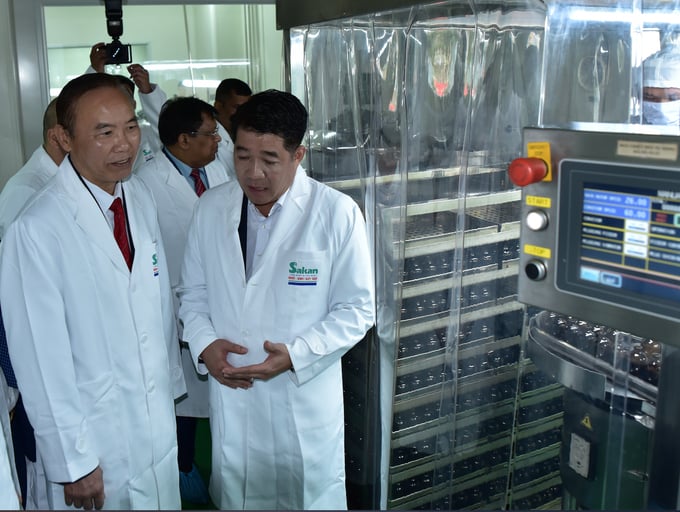
Deputy Minister of Agriculture and Rural Development Phung Duc Tien (left) discussing with Mr. Vu Manh Hung, Chairman of Hung Nhon Group and Visakan Company, regarding the development direction of veterinary medicine exports to Muslim countries. Photo: Minh Phuc.
"Consequently, Visakan's export of veterinary medicine to the country with the largest Muslim population in the world, Indonesia, is considered a significant milestone in the development strategy of Hung Nhon Group," emphasized Mr. Vu Manh Hung.

Mr. Gabor Fluit, Global CEO of Royal De Heus, commits to using Visakan's veterinary products to establish disease-safe farming areas, with a focus on antibiotic-free farming, in De Heus farms. Photo: Minh Phuc.
At the event, Mr. Gabor Fluit revealed the Royal De Heus's collaboration strategy with Hung Nhon Group. Accordingly, the two spearheads, De Heus and Hung Nhon, in coordination with other members, will develop a closed-loop supply chain, operating under a green, sustainable model. This initiative is also a popular approach among global corporations, also known as the "from farm to table" model.
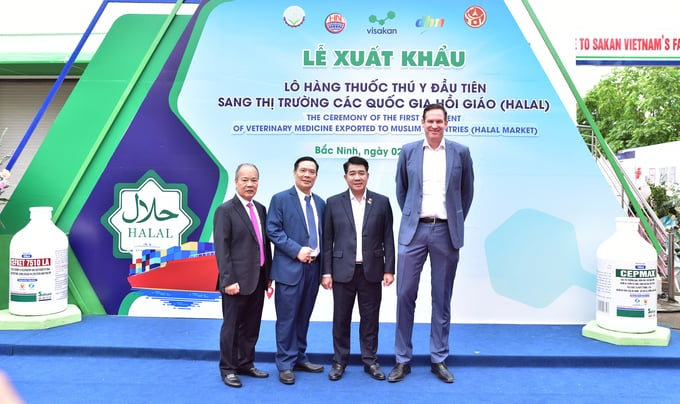
The management of Visakan Company taking a commemorative photograph with Mr. Gabor Fluit, Global CEO of Royal De Heus. Photo: Minh Phuc.
According to Mr. Vu Manh Hung, the Ministry of Agriculture and Rural Development, the Tay Ninh Provincial People's Committee, Hung Nhon Group, and Royal De Heus organized a series of events on May 18, which include the inauguration ceremony of the DHN Tay Ninh High-Tech Livestock Production Zone; the groundbreaking ceremony for seven key projects under the DHN Tay Ninh High-Tech Agricultural Complex; the ceremony for the recognition of the Disease-Free Zone in Tay Ninh province, and the announcement of the Plan to export poultry products to the Halal market.
During his presentation, Mr. Tran Van Binh, General Director of Visakan, revealed that the shipment consists of antibiotics and disinfectants under the brand Sakan, with a total export value reaching over 200,000 USD.
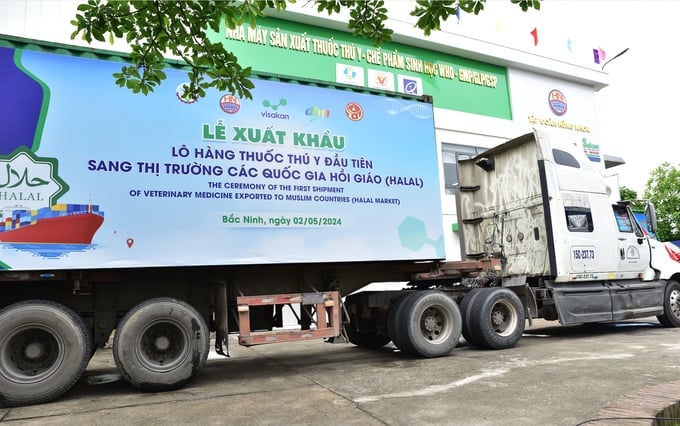
Visakan's first export shipment of veterinary medicine to the Halal market. Photo: Minh Phuc.
The aforementioned products are manufactured by NonBetalactam and Betalactam factories, which have been certified by the Ministry of Agriculture and Rural Development for adhering to the World Health Organization's Good Manufacturing Practice (GMP/GLP/GSP) standards. The factories feature five certified production lines for pharmaceutical powders, injectables, granules, injectable solutions and oral medications. Notably, Sakan currently manages a laboratory that complies with ISO/IEC 17025:2017 standards.
According to Mr. Tran Van Binh, the company currently features over 200 products licensed for circulation in the domestic market. He also highlighted the company's ongoing partnership with animal feed companies, distributors, and livestock and aquaculture farms nationwide.
In addition to the Indonesian market, 23 Sakan brand product lines are available in 13 countries and territories worldwide.
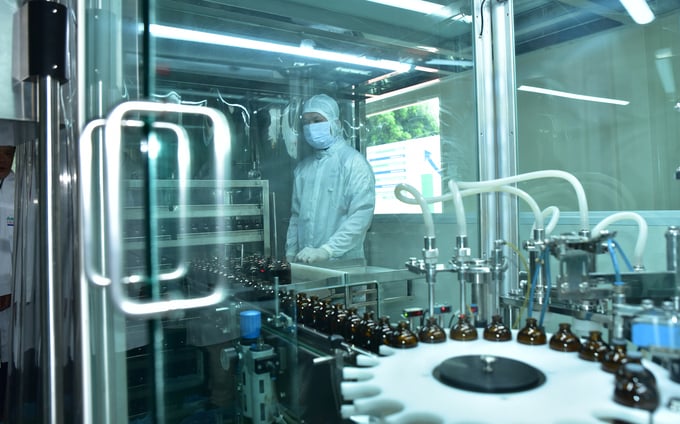
A look inside the veterinary medicine production line in compliance with the GMP/GLP/GSP standards for Good Manufacturing Practice set by the World Health Organization at Visakan. Photo: Minh Phuc.
A selection of Sakan brand products are currently being exclusively distributed by Visakan. According to the company's plan, Visakan aims to achieve a revenue of over 300 billion Vietnamese dong (10.7 million USD) in 2024. Additionally, the company's target revenue for the years between 2025 and 2030 is over 1,200 billion Vietnamese dong (48 million USD).
In addition to the ceremony ceremony for the first export shipment of veterinary medicine to the Halal market, three businesses including Visakan, PT. Ekasapta Wijayatangguh (Indonesia), and De Heus Indonesia signed a Memorandum of Understanding on a collaborative production and supply chain program for veterinary medicine and disinfectants in Indonesia.
Under this Memorandum, Visakan will be responsible for supplying qualified veterinary medicine and disinfectants as requested by partners; PT. Ekasapta Wijayatangguh will be responsible for managing the importation and distribution of products for De Heus Indonesia in the Indonesian market; De Heus Indonesia will be responsible for prioritizing the use of products supplied by members of the Memorandum of Understanding.
According to Deputy Minister Phung Duc Tien, all 90 veterinary medicine and vaccine production facilities nationwide have received the Good Manufacturing Practice certificates in accordance with the regulations of the World Health Organization (WHO-GMP).
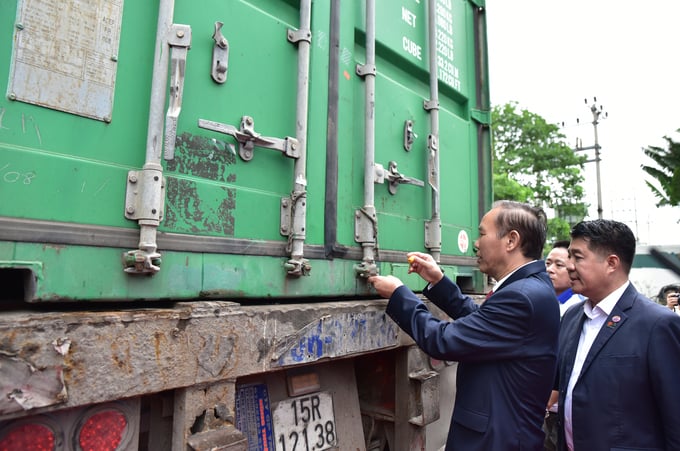
Deputy Minister Phung Duc Tien securing the lead seal on the container of Visakan's first veterinary medicine shipment to the Halal market. Photo: Minh Phuc.
A challenging accomplishment for the majority of countries in the ASEAN region and the world, this export shipment represents a monumental milestone for Vietnam's veterinary sector. Vietnam currently has over 13,000 registered veterinary medicine products in circulation, with over 200 veterinary vaccine products that meet the national demand for preventing and treating diseases in livestock, poultry, and aquaculture. Nearly 2,000 types of Vietnamese veterinary medicine have been exported to over 40 countries and territories around the world.
The volume of veterinary medicine exports is on an upward trajectory, with an average annual export of over 22 million USD. Notably, Visakan Biotechnology Development Investment Company (Sakan) have made important contributions to the success of Vietnam's veterinary medicine manufacturing sector.
To date, Sakan has registered 198 veterinary medicine products, 48 livestock nutritional products, and 40 aquaculture nutritional products for domestic circulation. In terms of veterinary medicine value, the company produced an average of 165 billion Vietnamese dong per year between 2018 and 2023.
The products of Sakan Company have established a reputation for reliability, quality, and brand recognition in Vietnam. They are currently distributed through agents and livestock and aquaculture farms across all 63 provinces and cities nationwide. Notable clients include major livestock and animal feed production conglomerates such as Dabaco, Masan, C.P, and De Heus.
Ms. Nguyen Huong Giang, Chairwoman of the Bac Ninh Provincial People's Committee, highlighted the significance of the export shipment for Bac Ninh province and the Vietnam's agricultural sector as a whole. Furthermore, the event marked a pivotal step forward in the research and production of modern veterinary medicine products, with a focus on complying with the stringent standards and requirements of the global market.
"The Halal market is among the most demanding markets in the world with a series of stringent standards. As a result, Visakan's first export shipment of veterinary medicine to the Halal market is a crucial turning point in the development strategy of Hung Nhon Group," Ms. Nguyen Huong Giang added.
Translated by Nguyen Hai Long

(VAN) A cutting-edge farming technique being implemented on an experimental ranch in Arizona's Sonoran Desert has already saved a billion gallons of water over five years, according to Civil Eats.

(VAN) Poultry and pig production and the environment can be boosted through enhanced water technology, according to new research.
![Turning wind and rain into action: [4] Bringing climate bulletins to remote and isolated areas](https://t.ex-cdn.com/nongnghiepmoitruong.vn/608w/files/linhnhp/2025/06/14/1152-z6704423696987_15fd32ffc26d590d204d520c9dac6786-nongnghiep-151141.jpg)
(VAN) The Vietnam Agriculture and Nature Newspaper interviewed Mr. Vu Thai Truong, Acting Head of Climate Change and Environment at UNDP Vietnam, to gain deeper insight into how climate bulletins are delivered to farmers.

(VAN) In Tien Giang, a high-tech shrimp farm has developed a distinctive energy-saving farming model that has yielded promising results.
![Turning wind and rain into action: [3] 300.000 farmers benefit from agro-climatic bulletins](https://t.ex-cdn.com/nongnghiepmoitruong.vn/608w/files/news/2025/06/12/e5a48259d6a262fc3bb3-nongnghiep-125122.jpg)
(VAN) The agro-climatic bulletin has become a valuable tool for farmers in the Mekong Delta. After more than five years of implementation, the initiative is gradually being expanded nationwide.
![Turning wind and rain into action: [2] Providing forecasts to the people](https://t.ex-cdn.com/nongnghiepmoitruong.vn/608w/files/news/2025/06/12/e5a48259d6a262fc3bb3-nongnghiep-103927.jpg)
(VAN) In addition to improving the quality of hydrometeorological forecasts, putting forecast bulletins into practical use is crucial for production and disaster prevention.

(VAN) Blue carbon is receiving attention for its rapid absorption capacity and vast potential. It represents a promising nature-based solution to respond to climate change.